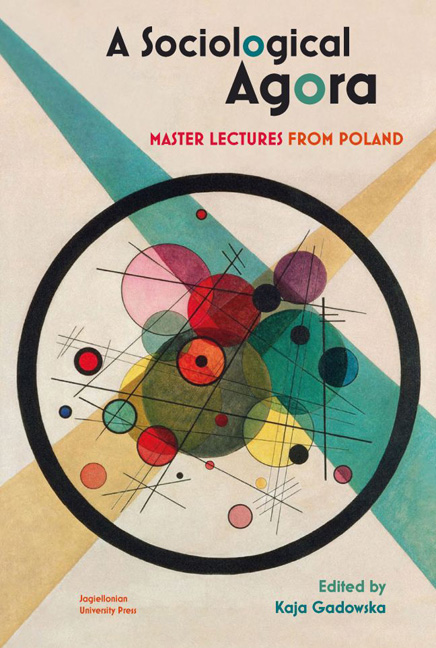Book contents
- Frontmatter
- Contents
- Society in a Time of Pandemia: Postmodern Problems from a Social and Humanistic Perspective
- Trust and Risk in the Time of Pandemia
- The Mythologized Populist Imagination, Carnival Rebellion, and the Fate of Liberal Democracy
- Applied Feminism: Women’s Rebellion and Identity
- On Law and its Interpretative Artifacts
- On Legal Nihilism Once More: Lessons from Poland
- Minima iuridica: Reflections on certain legal (un)obviousnesses
- Community—Meaning What?
- An Essay on Welfare: Problematic and Debatable Issues
- Sources of an Ecclesiastical System Success
- About the Authors
- About the Editor
- About the Translator
- Polish Sociological Association
On Law and its Interpretative Artifacts
Published online by Cambridge University Press: 01 March 2024
- Frontmatter
- Contents
- Society in a Time of Pandemia: Postmodern Problems from a Social and Humanistic Perspective
- Trust and Risk in the Time of Pandemia
- The Mythologized Populist Imagination, Carnival Rebellion, and the Fate of Liberal Democracy
- Applied Feminism: Women’s Rebellion and Identity
- On Law and its Interpretative Artifacts
- On Legal Nihilism Once More: Lessons from Poland
- Minima iuridica: Reflections on certain legal (un)obviousnesses
- Community—Meaning What?
- An Essay on Welfare: Problematic and Debatable Issues
- Sources of an Ecclesiastical System Success
- About the Authors
- About the Editor
- About the Translator
- Polish Sociological Association
Summary
INTERPRETATIONS—A BATTLE FOR POWER TO SHAPE THE MEANING OF THE LAW
1. Being a normative phenomenon, the law speaks of how things ought to be—not how things are. Additionally, as a creation of the human mind, the law is itself an artifact, invented in order to be able to shape social reality by endowing behaviors and facts (in their various combinations) with some conventional meaning.
The genesis (at least contemporaneously) begins with a specific text passed by a parliament. Once signed into law, however, it will be a living instrument. That act—ratified by a legislature and inscribed into a legal code—goes out into the world, all the while altering its sense under the influence of those who use that law and whose interpretations bestow it with meaning. On the one hand, not always and not wholly are those shifts in accord with the expectations of the initiators or endorsers of the text. On the other hand, reduction of the law to its literal script would be a mistake. For this reason, among others, the object of constitutionality control is not the original text, but the version shaped by the constant and repeated practice of the law's application.2 The law-artifact thus undergoes correction (and occasionally distortion) as a result of the appearance of yet another artifact, i.e., interpretation. The text at hand deals specifically with this secondary artifactization as a result of interpretations—especially those leaning towards manipulation.
Lawyers who are also academics teaching the law and focusing on the legal text and an extraction of its “correct” meaning pay too little attention to the artifactitious nature of the law itself and its interpretation. They are likely to associate the normativity of the law with a description of reality. This, in turn, leads to false conclusions made with reference to optimalization of the law (e.g., belief in actual agency in the adoption or revision of the law). This fact renders attorneys defenseless against many (especially political) manipulations of the law.
- Type
- Chapter
- Information
- A Sociological AgoraMaster Lectures from Poland, pp. 79 - 100Publisher: Jagiellonian University PressPrint publication year: 2023



